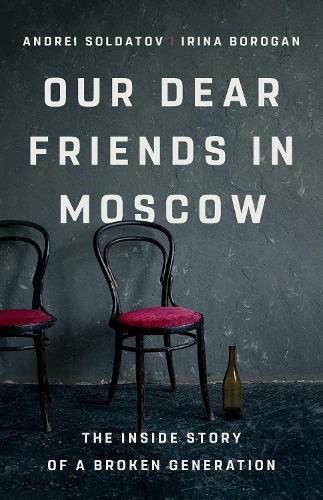Readings Newsletter
Become a Readings Member to make your shopping experience even easier.
Sign in or sign up for free!
You’re not far away from qualifying for FREE standard shipping within Australia
You’ve qualified for FREE standard shipping within Australia
The cart is loading…






Two of Russia's best investigative journalists tell the story of how the hopes of their generation of optimistic Russians in the 1990s faded to be replaced by autocracy, fear, and betrayal
Our Dear Friends in Moscow tells the story of a group of young Russians, part of an idealistic generation who came of age in Moscow at the end of the twentieth century, just as the communist era imploded and a future full of potential, and uncertainty, stood in front of them. Initially, the group seized and enjoyed the freedoms of the new era, but quickly the notion that Russia was destined to join the West, and Europe, in a new partnership began to fade. At home the economy imploded, civil war stalked the Russian border in Chechnya, and terrorism came to Moscow. More discreetly, the new Russian government began to pull back from reconciliation with the United States and the West; by the time of Vladimir Putin's second and apparently endless term as president, the country had embraced a kind of ethno-nationalism and as heading for war at home and abroad.
The group is torn apart by the shift in Russia. Some flee; others become sinister agents of the ever more aggressive state. The center cannot hold.
$9.00 standard shipping within Australia
FREE standard shipping within Australia for orders over $100.00
Express & International shipping calculated at checkout
Two of Russia's best investigative journalists tell the story of how the hopes of their generation of optimistic Russians in the 1990s faded to be replaced by autocracy, fear, and betrayal
Our Dear Friends in Moscow tells the story of a group of young Russians, part of an idealistic generation who came of age in Moscow at the end of the twentieth century, just as the communist era imploded and a future full of potential, and uncertainty, stood in front of them. Initially, the group seized and enjoyed the freedoms of the new era, but quickly the notion that Russia was destined to join the West, and Europe, in a new partnership began to fade. At home the economy imploded, civil war stalked the Russian border in Chechnya, and terrorism came to Moscow. More discreetly, the new Russian government began to pull back from reconciliation with the United States and the West; by the time of Vladimir Putin's second and apparently endless term as president, the country had embraced a kind of ethno-nationalism and as heading for war at home and abroad.
The group is torn apart by the shift in Russia. Some flee; others become sinister agents of the ever more aggressive state. The center cannot hold.